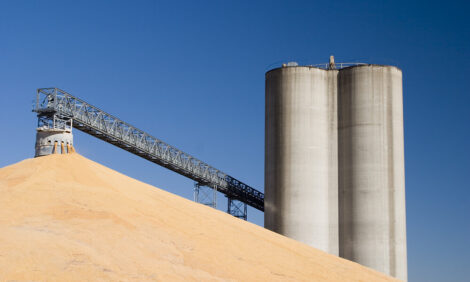



The Global Food Challenge
In 1798, Thomas Robert Malthus forecast that it would be impossible to improve wheat yields as fast as people made babies. This Malthusian Crash was staved off in the 19th and 20th century but perhaps he will be right two centuries late, for I believe that the human race will lose its capacity to feed itself in this 21st century.There are four factors that will affect this outcome; the first is population growth. Each year the world population increases by around 80 million - with 97% occurring in developing countries - and, according to UN projections, it will rise to 9 billion by 2050.
Rising incomes lead to increased protein consumption; China could consume 70 kilos of meat per capita per annum by 2030, requiring as much animal feed as the world currently produces. Over the next 20 years, with an increase in demand of 40%, pigmeat will still be the world's no 1 meat.
The second factor that could affect our capacity to feed ourselves is soil. Arable land is decreasing due to building and erosion so that, with population growth, farmland per capita is expected to shrink to 0.18 hectares by 2020.
Water is the third determining issue as worldwide it is a scarce resource with only 2.5% of all water being freshwater, and 66% of this is stored in the icecaps. Underground aquifers are being depleted at an unsustainable rate. Now, more than ever, humans depend on irrigation, with the 20% of land irrigated producing 40% of the world's food. History warns that most irrigation-based civilisations flounder when those systems collapse!
Whether yield growth is closer to the 1% rate of the last decade or 2% rate of the previous four decades is not important because in the end water scarcity will limit agricultural production.
The fourth factor is climate change; indeed at this year's Oxford Farming Conference scientist Sir John Houghton stated that global warming from human activities represents the 21st century's biggest challenge, leading to both more droughts and more floods.
For UK agriculture, future opportunities include the change to a bio-economy. Plants as bio refineries can make many products cheaply - starches, sugars, fibres, biomass, oils, proteins - so in future there will be competition for land to produce food, feed, chemicals, materials and fuels.
Bio-science will be the science of the 21st century. Sadly, UK scientific research lacks concerted support and the future of a UK research base focusing on agricultural bio-sciences is uncertain.
In 2006, 10 million farmers in 22 countries planted GM crops. 90% of them were resource poor farmers from developing countries. The enormous scientific lead once held by the UK has been lost by poor government leadership and well funded activist groups. However, this sort of bio-science is essential if we are to feed ourselves. I believe that the biotech companies have a better understanding of mankind's needs in the 21st century than most governments and environmental organisations.
Biomass, biofuel and biogas all give farmers great opportunities. Whilst subsidy is important in pump priming ethanol plants, they need to be competitive even at lower oil and higher grain prices. With Biogas, the UK has fallen behind. In Germany there are 3000 farms with biogas plants, in the UK just two.
At JSR we grow 60+ acres of willow, most of which is delivered to the Drax power station. To avoid getting into another commodity business, however, the objective is to sell heat rather than woodchips - capturing the added value for ourselves.
Diet, labelling, food miles, ethical production and quality all give UK farmers opportunities to add value. Scottish provenance and branding are particularly powerful consumer motivators. Changing consumer preferences has also brought eating quality into mainstream focus. As a breeding company, we aim to produce animals that both perform well on the farm and produce better eating quality.
We introduced the Stabiliser breed in 1998 as an alternative to the Holstein derived suckler cow. This 4 way composite animal is now the UK's fifth largest and fastest growing breed. Of exceptional quality, and much in demand by the local food service sector, Stabiliser beef is now marketed under the Givendale Prime brand managed by Richard Fuller.
In our pig business, better eating quality programmes are based mainly on the Duroc and Hampshire breeds. Genomics now allows us to select for traits such as meat quality by identifying the DNA in live animals, rather than after slaughter. Whilst quantitative genetics will remain the main driver of genetic improvement over the next decade, understanding our animal's genetic make-up will allow us to "bolt on" genomics and to implement techniques such as Marker Assisted Selection.
In an era of higher commodity prices we recognise that feed efficiency becomes even more important in reducing production costs. So better meat eating quality must not be at the expense of prolificacy and feed efficiency.
Since the Fischler CAP reforms of 2003 farming has become market driven, so we need to become more competitive, through better performance and cost management. Whilst diversification, organics and non-farm income provide a solution for some, the majority focussing on hard nosed commercial farming need three factors: scale, access to the latest technology and skilled people with the right attitude to take on new challenges.
In the future I believe that bio-science, as the science of the 21st century, has the potential to prove Malthus wrong again. As farmers, we will be fortunate to have more choice as to what to grow or raise on our land. At some stage the penny will drop with our Politicians and bureaucrats. Bioscience put into practice by farmers will be the solution to feed and power the world as we move away from the oil economy to the Bio-economy.








